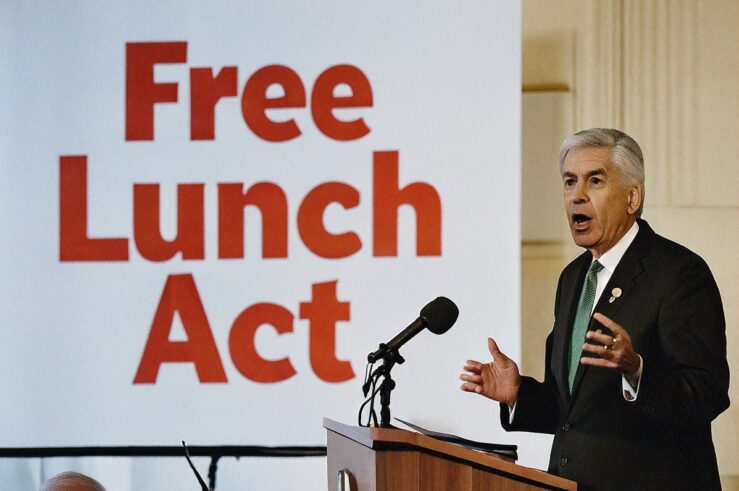TechFreedom and the International Center for Law & Economics will shortly file two joint comments with the FCC, explaining why the FCC has no sound legal basis for micromanaging the Internet—now called “net neutrality regulation”—and why such regulation would be counter-productive as a policy matter. The following summarizes some of the key points from both sets of comments.
No one’s against an open Internet. The notion that anyone can put up a virtual shingle—and that the good ideas will rise to the top—is a bedrock principle with broad support; it has made the Internet essential to modern life. Key to Internet openness is the freedom to innovate. An open Internet and the idea that companies can make special deals for faster access are not mutually exclusive. If the Internet really is “open,” shouldn’t all companies be free to experiment with new technologies, business models and partnerships? Shouldn’t the FCC allow companies to experiment in building the unknown—and unknowable—Internet of the future?
The best approach would be to maintain the “Hands off the Net” approach that has otherwise prevailed for 20 years. That means a general presumption that innovative business models and other forms of “prioritization” are legal. Innovation could thrive, and regulators could still keep a watchful eye, intervening only where there is clear evidence of actual harm, not just abstract fears. And they should start with existing legal tools—like antitrust and consumer protection laws—before imposing prior restraints on innovation.
But net neutrality regulation hurts more than it helps. Counterintuitively, a blanket rule that ISPs treat data equally could actually harm consumers. Consider the innovative business models ISPs are introducing. T-Mobile’s unRadio lets users listen to all the on-demand music and radio they want without taking a hit against their monthly data plan. Yet so-called consumer advocates insist that’s a bad thing because it favors some content providers over others. In fact, “prioritizing” one service when there is congestion frees up data for subscribers to consume even more content—from whatever source. You know regulation may be out of control when a company is demonized for offering its users a freebie.
Treating each bit of data neutrally ignores the reality of how the Internet is designed, and how consumers use it. Net neutrality proponents insist that all Internet content must be available to consumers neutrally, whether those consumers (or content providers) want it or not. They also argue against usage-based pricing. Together, these restrictions force all users to bear the costs of access for other users’ requests, regardless of who actually consumes the content, as the FCC itself has recognized:
[P]rohibiting tiered or usage-based pricing and requiring all subscribers to pay the same amount for broadband service, regardless of the performance or usage of the service, would force lighter end users of the network to subsidize heavier end users. It would also foreclose practices that may appropriately align incentives to encourage efficient use of networks.
The rules that net neutrality advocates want would hurt startups as well as consumers. Imagine a new entrant, clamoring for market share. Without the budget for a major advertising blitz, the archetypical “next Netflix” might never get the exposure it needs to thrive. But for a relatively small fee, the startup could sign up to participate in a sponsored data program, with its content featured and its customers’ data usage exempted from their data plans. This common business strategy could mean the difference between success and failure for a startup. Yet it would be prohibited by net neutrality rules banning paid prioritization.
The FCC lacks sound legal authority. The FCC is essentially proposing to do what can only properly be done by Congress: invent a new legal regime for broadband. Each of the options the FCC proposes to justify this—Section 706 of the Telecommunications Act and common carrier classification—is deeply problematic.
First, Section 706 isn’t sustainable. Until 2010, the FCC understood Section 706 as a directive to use its other grants of authority to promote broadband deployment. But in its zeal to regulate net neutrality, the FCC reversed itself in 2010, claiming Section 706 as an independent grant of authority. This would allow the FCC to regulate any form of “communications” in any way not directly barred by the Act — not just broadband but “edge” companies like Google and Facebook. This might mean going beyond neutrality to regulate copyright, cybersecurity and more. The FCC need only assert that regulation would somehow promote broadband.
If Section 706 is a grant of authority, it’s almost certainly a power to deregulate. But even if its power is as broad as the FCC claims, the FCC still hasn’t made the case that, on balance, its proposed regulations would actually do what it asserts: promote broadband. The FCC has stubbornly refused to conduct serious economic analysis on the net effects of its neutrality rules.
And Title II would be a disaster. The FCC has asked whether Title II of the Act, which governs “common carriers” like the old monopoly telephone system, is a workable option. It isn’t.
In the first place, regulations that impose design limitations meant for single-function networks simply aren’t appropriate for the constantly evolving Internet. Moreover, if the FCC re-interprets the Communications Act to classify broadband ISPs as common carriers, it risks catching other Internet services in the cross-fire, inadvertently making them common carriers, too. Surely net neutrality proponents can appreciate the harmful effects of treating Skype as a common carrier.
Forbearance can’t clean up the Title II mess. In theory the FCC could “forbear” from Title II’s most onerous rules, promising not to apply them when it determines there’s enough competition in a market to make the rules unnecessary. But the agency has set a high bar for justifying forbearance.
Most recently, in 2012, the Commission refused to grant Qwest forbearance even in the highly competitive telephony market, disregarding competition from wireless providers, and concluding that a cable-telco “duopoly” is inadequate to protect consumers. It’s unclear how the FCC could justify reaching the opposite conclusion about the broadband market—simultaneously finding it competitive enough to forbear, yet fragile enough to require net neutrality rules. Such contradictions would be difficult to explain, even if the FCC generally gets discretion on changing its approach.
But there is another path forward. If the FCC can really make the case for regulation, it should go to Congress, armed with the kind of independent economic and technical expert studies Commissioner Pai has urged, and ask for new authority. A new Communications Act is long overdue anyway. In the meantime, the FCC could convene the kind of multistakeholder process generally endorsed by the White House to produce a code enforceable by the Federal Trade Commission. A consensus is possible — just not inside the FCC, where the policy questions can’t be separated from the intractable legal questions.
Meanwhile, the FCC should focus on doing what Section 706 actually demands: clearing barriers to broadband deployment and competition. The 2010 National Broadband Plan laid out an ambitious pro-deployment agenda. It’s just too bad the FCC was so obsessed with net neutrality that it didn’t focus on the plan. Unleashing more investment and competition, not writing more regulation, is the best way to keep the Internet open, innovative and free.
[Cross-posted at TechFreedom.]





